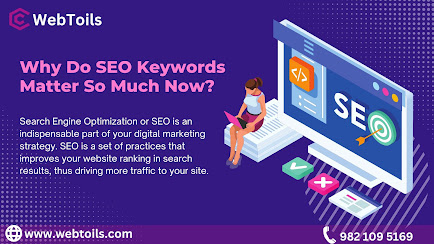What is the importance of keywords in a search engine?
Why Keywords Still
Matter So Much for SEO?
In order to improve relevant organic
search traffic, SEO keywords are utilized to inform website content. These
keywords might be single words or complex phrases. They are used by your target
market when looking for things connected to your brand. When thoroughly
investigated and optimized , keywords serve as a link between your website and
your target audience.
How
Do SEO Keywords Work?
They connect what people are searching for with the material you are producing to meet their needs, keywords are crucial. The keyword(s) you choose to target (i.e., the ones you choose to include in your content, among other things) will determine what kind of traffic you get when it comes to ranking on search engines. Your goal with ranking on search engines is to drive organic traffic to your site from the search engine result pages (SERPs). For instance, if you own a golf shop, you could want to rank for "new clubs"; yet, if you're not careful, you might end up drawing customers looking for a new location to dance after dark. Because you might define what you have to give in a way that differs significantly from how some customers might ask for it, keywords are as much about your audience as they are about your content. You must comprehend the demands of those visitors, including the language they use and the kinds of information they are looking for, in order to produce content that ranks highly organically and attracts visits to your website. By speaking with your consumers, participating in forums and community groups, and conducting your own keyword research using a program like keyword explorer, you can achieve this.
But
aren't SEO keywords "dead"?
The adage "Keywords are dead" keeps making their way
into SEO circles, whether you've heard it before or this is your first time.
Let's face this repeating, binary, and frequently click-bait
inspired assumption head-on rather than skirt around it.
This assertion has been
awakened from its slumber by a number of developments in the SEO industry, but
four in particular come to mind.
1.
"Keywords are" (no description given).
You might be surprised to learn that organic keywords were
formerly simple to find in Google Analytics, Adobe Omniture, or any other analytics
tool if you're new to SEO. However, when Google started making discreet moves
to eliminate keyword data in 2010, things started to change. There would be a
considerable loss of organic keyword visibility from late 2011 to the next
year.
2.
"Keywords become outdated due to AI and NLP."
Where Google updated its algorithm in 2013, this was yet another
occasion when the legitimacy of terms was questioned. Hummingbird earned its
moniker for being swift and exact, and it greatly aided Google in comprehending
the intent behind complicated and conversational searches. Google added the
AI-driven ranking feature RankBrain to the mix in 2015 to enhance its capacity
for query interpretation.
3.
"Voice search destroyed the value of keywords."
Many people pondered what this meant for keywords as voice
search evolved from being a novelty that we occasionally used to being a standard
in our search activity. Although voice search had an impact on keywords, did it
actually kill them?
We've
developed a long temper
We have become into quite conversational and thorough searchers
as a result of both of us (subconsciously) picking up on Google's enhanced
interpretation abilities and our communication preferences when speaking as
opposed to typing. Now, all we have to do is ask Google the question, "Who
was Brad Pitt's first wife?"
This is one of the key causes behind Google's daily finding of
15% of queries that have never been done before. Therefore, while it has been a
tremendous success for searchers, it has presented difficulties for SEO
experts.
We
Neglect Vital Keywords
Did you know that if you use voice search without including
Scarlett Johansson's name or the title of her record, you can learn the date of
release for her debut album? (Side note: Were you aware that Scarlett Johansson
has a record out?) Google is aware that context matters, both within individual
searches and between groups of related searches. Do keywords therefore matter
if you can exclude important information and still achieve your goals?
Of course!
This simply forces us to take a step back and consider the big
picture rather than analyzing each search in isolation.
4.
"Keyword Planner demonstrated how similar keywords really are."
Google's Keyword Planner tool started combining volumes for
related terms in 2014 and stepped things up two years later.
Instead of reporting that keyword A receives 100 monthly
searches while keyword A1 receives 50, both would display 150.
Google stated that this was done to "maximize the potential
for your advertising to surface on relevant searches" and to "ensure
you don't miss out on potential consumers." That justification definitely
implies that there isn't much difference in searcher intent across closely
similar phrases. The action appeared to support the idea that subjects, not
keywords, are the only thing SEO specialists need to be concerned about. This
doesn't, however, explain why, for terms that Google Keyword Planner thinks
synonymous enough to cluster together, Google Search frequently dramatically
alters its results. Instead of reporting that keyword A receives 100 monthly
searches while keyword A1 receives 50, both would display 150.
Google stated that this was done to "maximize the potential
for your advertising to surface on relevant searches" and to "ensure
you don't miss out on potential consumers. "That justification definitely
implies that there isn't much difference in searcher intent across closely
similar phrases. The action appeared to support the idea that subjects, not
keywords, are the only thing SEO specialists need to be concerned about. This
doesn't, however, explain why, for terms that Google Keyword Planner thinks
synonymous enough to cluster together, Google Search frequently dramatically
alters its results.




Comments
Post a Comment